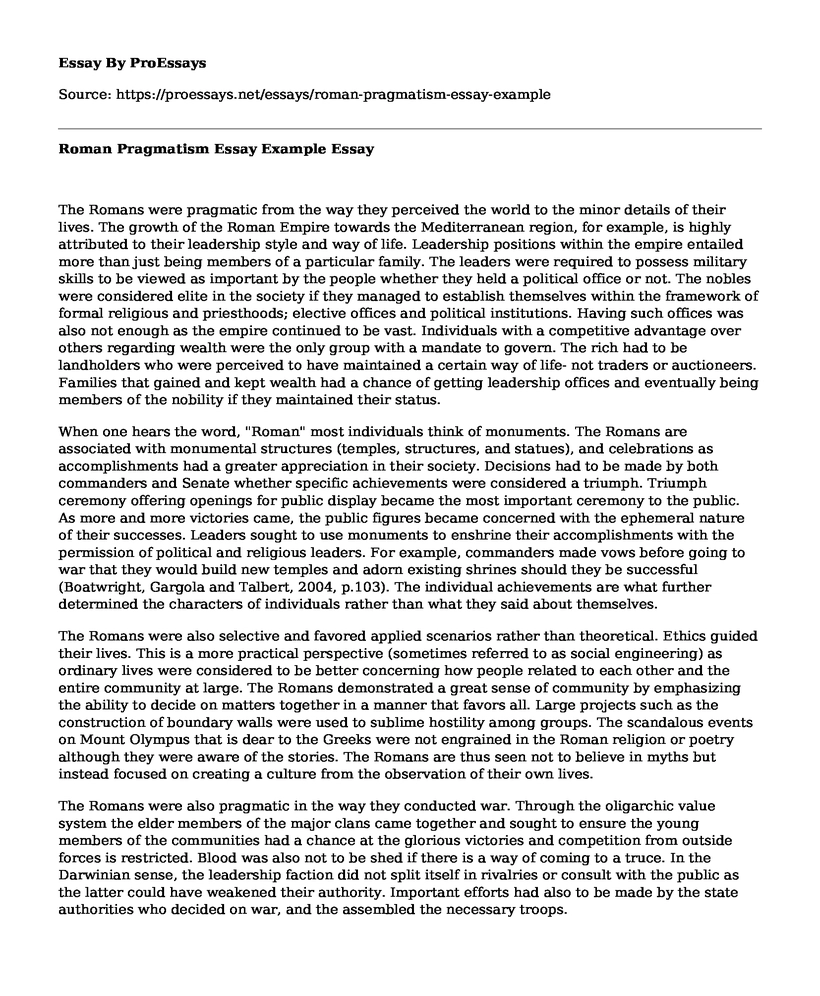The Romans were pragmatic from the way they perceived the world to the minor details of their lives. The growth of the Roman Empire towards the Mediterranean region, for example, is highly attributed to their leadership style and way of life. Leadership positions within the empire entailed more than just being members of a particular family. The leaders were required to possess military skills to be viewed as important by the people whether they held a political office or not. The nobles were considered elite in the society if they managed to establish themselves within the framework of formal religious and priesthoods; elective offices and political institutions. Having such offices was also not enough as the empire continued to be vast. Individuals with a competitive advantage over others regarding wealth were the only group with a mandate to govern. The rich had to be landholders who were perceived to have maintained a certain way of life- not traders or auctioneers. Families that gained and kept wealth had a chance of getting leadership offices and eventually being members of the nobility if they maintained their status.
When one hears the word, "Roman" most individuals think of monuments. The Romans are associated with monumental structures (temples, structures, and statues), and celebrations as accomplishments had a greater appreciation in their society. Decisions had to be made by both commanders and Senate whether specific achievements were considered a triumph. Triumph ceremony offering openings for public display became the most important ceremony to the public. As more and more victories came, the public figures became concerned with the ephemeral nature of their successes. Leaders sought to use monuments to enshrine their accomplishments with the permission of political and religious leaders. For example, commanders made vows before going to war that they would build new temples and adorn existing shrines should they be successful (Boatwright, Gargola and Talbert, 2004, p.103). The individual achievements are what further determined the characters of individuals rather than what they said about themselves.
The Romans were also selective and favored applied scenarios rather than theoretical. Ethics guided their lives. This is a more practical perspective (sometimes referred to as social engineering) as ordinary lives were considered to be better concerning how people related to each other and the entire community at large. The Romans demonstrated a great sense of community by emphasizing the ability to decide on matters together in a manner that favors all. Large projects such as the construction of boundary walls were used to sublime hostility among groups. The scandalous events on Mount Olympus that is dear to the Greeks were not engrained in the Roman religion or poetry although they were aware of the stories. The Romans are thus seen not to believe in myths but instead focused on creating a culture from the observation of their own lives.
The Romans were also pragmatic in the way they conducted war. Through the oligarchic value system the elder members of the major clans came together and sought to ensure the young members of the communities had a chance at the glorious victories and competition from outside forces is restricted. Blood was also not to be shed if there is a way of coming to a truce. In the Darwinian sense, the leadership faction did not split itself in rivalries or consult with the public as the latter could have weakened their authority. Important efforts had also to be made by the state authorities who decided on war, and the assembled the necessary troops.
References
Boatwright, M. T., Gargola, D. J., & Talbert, R. J. A. (2004). Romans: from village to empire. Retrieved from https://ebookcentral-proquest-com.ezproxy1.apus.edu
Cite this page
Roman Pragmatism Essay Example. (2022, Jul 25). Retrieved from https://proessays.net/essays/roman-pragmatism-essay-example
If you are the original author of this essay and no longer wish to have it published on the ProEssays website, please click below to request its removal:
- Christianity Role in Independence of Slaves Essay Example
- George O'Leary's Dismissal Paper Example
- Essay Sample on Hiram Park Bell: An Iconic American Life
- Essay Example on Heroic WWI Soldiers Recognized: Pvt. Johnson & Sgt. Shemin
- Paper Sample on The Painted Bird: An Unbearable Tale of Man's Cruelty
- Post Civil War Life - Essay Example
- Civilization in Mesopotamia, Egypt and China - Essay Sample







